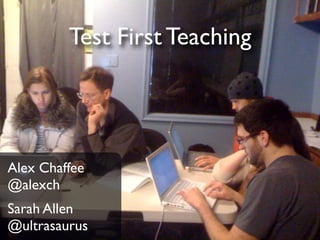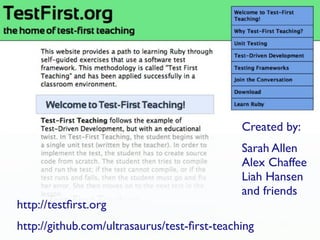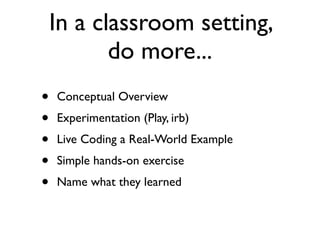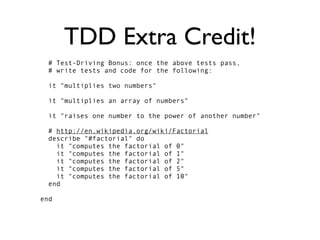Test First Teaching
- 1. Test First Teaching Alex Chaffee @alexch Sarah Allen @ultrasaurus
- 2. Why should you care? • you want to learn Ruby • you want to improve your Ruby skills • you have a friend or colleague who wants to learn Ruby • you want to help us improve our materials • by teaching, you learn...
- 3. No, seriously: by teaching, you learn! • the best engineers are good teachers • we live and work in collaborative environments • it is not enough to know any thing well • we must teach in order to effectively produce software
- 4. What is Test-First Teaching? • teacher provides microtests • student makes them pass • one test at a time • can be used guided (in classroom) or solo • or with a pair
- 6. Pairing in the classroom • students learn together and teach each other • each pair can proceed through exercises at their own pace • teacher is freed to wander the room
- 7. How do we know it's a good idea? 2002 Alex Chaffee jGuru Java curriculum 2005 Mike Clark many Ruby Learning Tests independent 2006 ara.t.howard inventors Ruby Quiz #67 "Metakoans" 2008 Yehuda Katz & Matt Aimonetti Ruby on Rails training Who else? http://www.flickr.com/photos/annais/9335897/sizes/z/
- 8. How do we know it's a good idea? it works
- 9. Learning Ruby via Tests • [Test-First Teaching](http://testfirst.org) by Sarah Allen and Alex Chaffee • [Ruby Koans](http://rubykoans.com) by Jim Weirich and Joe O’Brien • [Metakoans](http://rubyquiz.com/quiz67.html) by ara.t.howard
- 10. Other Guided Learning • [ruby-warrior](http://github.com/ryanb/ruby-warrior) by Ryan Bates - a game written in Ruby for learning Ruby • [Try Ruby](http://tryruby.org) runs a Ruby interpreter in your browser, with hints and advice • [Growing OO Software In Ruby](http://www.exampler.com/ blog/2009/12/17/growing-object-oriented-software-in-ruby/) by Brian Marick • Ruby version of [Growing Object-Oriented Software Guided by Tests](http://www.growing-object-oriented- software.com/)
- 11. Created by: Sarah Allen Alex Chaffee Liah Hansen and friends Test-First Teaching.... http://testfirst.org Maybe we should call it Test-First Learning http://github.com/ultrasaurus/test-first-teaching
- 12. Traditional Professional Programming Classes Big, Boring Lecture Followed by Exercises • multiple choice • fill in the blanks with words or pseudocode • skeleton code - big program with chunks excised and replaced with comments • large task - soup to nuts without feedback .flickr.com/photos/chasephotography/3890300709/
- 13. writing code is engaging
- 14. Methodology • Run the test • Watch it fail • Write code to fix the first failure • See it pass • Refactor Sound familiar?
- 16. Why TFT? • makes the assignment very clear • student gets immediate feedback on progress (or lack thereof) • removes the magic • leads the student through all the steps to writing the code • teaches student to read errors
- 17. Embrace Failure
- 18. Embrace Failure • start from a point of failure • it feels like it's not your fault • people learn better when they're not stressed • playfulness enhances learning
- 19. In a classroom setting, do more... • Conceptual Overview • Experimentation (Play, irb) • Live Coding a Real-World Example • Simple hands-on exercise • Name what they learned
- 20. TFT Examples Let's look at some code
- 21. Arithmetic require "calculator" describe Calculator do before do @calculator = Calculator.new end it "adds 0 and 0" do @calculator.add(0,0).should == 0 end it "adds 2 and 2" do @calculator.add(2,2).should == 4 end it "adds positive numbers" do @calculator.add(2,6).should == 8 end it "subtracts numbers" do @calculator.subtract(10,4).should == 6 end end
- 23. require "pig_latin" describe "#translate" do Strings include PigLatinTranslator it "should translate a simple word" do s = translate("nix") s.should == "ixnay" end it "should translate a word beginning with a vowel" do s = translate("apple") s.should == "appleay" end it "should translate a word with two consonants" do s = translate("stupid") s.should == "upidstay" end it "should translate two words" do s = translate("eat pie") s.should == "eatay iepay" end it "should translate many words" do s = translate("the quick brown fox") s.should == "ethay ickquay ownbray oxfay" end end
- 24. Pig Latin Solution module PigLatinTranslator def translate(s) s.split.map do |word| v = first_vowel(word) word.slice(v..-1) + word[0,v] + "ay" end.join(" ") end def first_vowel(word) if word =~ /^qu/ 2 else word.gsub(/[aeiou].*$/, '').size end end end
- 25. Another Pig Latin Solution module PigLatinTranslator def translate(s) words = s.split s = words.map do |s| l = s.length if /^[aeiou]/ .match(s) s + "ay" elsif /^qu/ .match(s[0..1]) s[2..(l+1)] + s[0..1] + "ay" elsif /[aeiou]/ .match(s[1..1]) s[1..(l+1)] + s[0..0] + "ay" else s[2..(l+1)] + s[0..1] + "ay" end end s = s.join(" ") end end
- 26. And Another Pig Latin Solution module PigLatinTranslator def translate(word) words = word.split(" ") arrResult = [] words.each do |word| m = word.match(/^(qu)*[^aeiou]*/) if(m.nil?) arrResult << add_ay(word) else arrResult << add_ay(m.post_match + m.to_s) end end arrResult.join(" ") end def add_ay(word) word + "ay" end end
- 27. Iterators describe Calculator do before do @calculator = Calculator.new end describe "#sum" do it "computes the sum of an empty array" do @calculator.sum([]).should == 0 end it "computes the sum of an array of one number" do @calculator.sum([7]).should == 7 end it "computes the sum of an array of two numbers" do @calculator.sum([7,11]).should == 18 end it "computes the sum of an array of many numbers" do @calculator.sum([1,3,5,7,9]).should == 25 end end
- 28. Iterators require "array_extension" describe Array do describe "#sum" do it "should be 0 for an empty array" do [].sum.should == 0 end it "should add all of the elements" do [1,2,4].sum.should == 7 end end end (and open classes)
- 29. TDD Extra Credit! # Test-Driving Bonus: once the above tests pass, # write tests and code for the following: it "multiplies two numbers" it "multiplies an array of numbers" it "raises one number to the power of another number" # http://en.wikipedia.org/wiki/Factorial describe "#factorial" do it "computes the factorial of 0" it "computes the factorial of 1" it "computes the factorial of 2" it "computes the factorial of 5" it "computes the factorial of 10" end end
- 31. Solutions for Challenging Idioms blocks time method missing builder pattern
- 32. Blocks require "performance_monitor" (and mocks) it "takes exactly 1 second to run a block that describe PerformanceMonitor do sleeps for 1 second (with stubs)" do before do fake_time = 100 @monitor = PerformanceMonitor.new Time.stub!(:now).and_return {fake_time} end @monitor.run do fake_time += 1 it "takes about 0 seconds to run an empty block" do end.should == 1 @monitor.run do end end.should be_close(0, 0.1) end it "runs a block N times" do n = 0 it "takes exactly 0 seconds to run an empty block @monitor.run(4) do (with stubs)" do n += 1 Time.stub!(:now).and_return(100) end @monitor.run do n.should == 4 end.should == 0 end end it "returns the average time, not the total time, it "takes about 1 second to run a block that sleeps when running multiple times" do for 1 second" do run_times = [8,6,5,7] @monitor.run do run_index = 0 sleep 1 fake_time = 100 end.should be_close(1, 0.1) Time.stub(:now).and_return { fake_time } end @monitor.run(4) do fake_time += run_times[run_index] run_index += 1 end.should == 6 end end
- 33. method_missing, nested closures, and the builder pattern require "xml_document" it "nests several levels" do describe XmlDocument do @xml.hello do before do @xml.goodbye do @xml = XmlDocument.new @xml.come_back do end @xml.ok_fine(:be => "that_way") end it "renders an empty tag" do end @xml.hello.should == "<hello/>" end.should == end "<hello><goodbye><come_back><ok_fine be='that_way'/ ></come_back></goodbye></hello>" it "renders a tag with attributes" do end @xml.hello(:name => 'dolly').should == "<hello name='dolly'/>" it "indents" do end @xml = XmlDocument.new(true) @xml.hello do it "renders a randomly named tag" do @xml.goodbye do tag_name = (1..8).map{|i| @xml.come_back do ('a'..'z').to_a[rand(26)]}.join @xml.ok_fine(:be => "that_way") @xml.send(tag_name).should == "<#{tag_name}/>" end end end end.should == it "renders block with text inside" do "<hello>n" + @xml.hello do " <goodbye>n" + "dolly" " <come_back>n" + end.should == "<hello>dolly</hello>" " <ok_fine be='that_way'/>n" + end " </come_back>n" + " </goodbye>n" + it "nests one level" do "</hello>n" @xml.hello do end @xml.goodbye end end.should == "<hello><goodbye/></hello>" end
- 34. threads (sorry for the Java) public void testThreadSafe() throws InterruptedException { int DEPOSITORS = 50; int AMOUNT = 2; // note: increase this value until it *fails* on your CPU. // Then fix it. int REPS = 25000; Account account = new Account("Joe", 0); Thread[] depositors = new Thread[DEPOSITORS]; for (int i=0; i< DEPOSITORS; ++i) { depositors[i] = new Depositor(account, AMOUNT, REPS); depositors[i].start(); } for (int i=0; i< DEPOSITORS; ++i) { depositors[i].join(); } assertEquals(REPS * DEPOSITORS * AMOUNT, account.getBalance()); }
- 35. ruby koans • self-guided, test-driven • Ruby language basics • very fun, whimsical and elegant
- 36. ruby koans example require File.expand_path(File.dirname(__FILE__) + '/edgecase') class AboutStrings < EdgeCase::Koan def test_double_quoted_strings_are_strings string = "Hello, World" usually self- assert_equal __, string.is_a?(String) end contained def test_single_quoted_strings_are_also_strings just tests and fixtures, string = 'Goodbye, World' with no class declaration assert_equal __, string.is_a?(String) end def test_use_single_quotes_to_create_string_with_double_quotes “fill in the string = 'He said, "Go Away."' assert_equal __, string blanks” end technique def test_use_double_quotes_to_create_strings_with_single_quotes string = "Don't" assert_equal __, string end teaching through def test_use_backslash_for_those_hard_cases practice and a = "He said, "Don't"" b = 'He said, "Don't"' challenge assert_equal __, a == b end
- 37. TFT != TDD • Mechanics of testing are hard to learn • TFT teaches programming; TDD is design • At the end of some modules, students write their own tests for “extra credit” • doesn’t really flex the creative muscles required for software design
- 38. What about TDD? • easier to learn TDD, post-TFT • know the language • know the test framework • used to the rhythm of test-first • study design patterns, or check out [GOOS] (http://www.exampler.com/blog/2009/12/17/ growing-object-oriented-software-in-ruby).
- 39. Credits • Mr. Clean® is a registered trademark of Procter & Gamble, used without permission • Parody is fair use! • Fail Whale illustrated by Yiying Lu (http:// www.yiyinglu.com/) • Pair Programming photos by Lee Lundrigan • Thank you Flickr and Creative Commons (see slides for attribution)
- 41. Alex alexch.github.com @alexch Erector Moodlog Cohuman Wrong
- 42. Learning should be fun • Questions?
Editor's Notes
- #36: TFT is not sufficient for learning, but needs to be one component of a curriculum or course of self-study.










by Sarah Allen and Alex Chaffee
• [Ruby Koans](http://rubykoans.com)
by Jim Weirich and Joe O’Brien
• [Metakoans](http://rubyquiz.com/quiz67.html)
by ara.t.howard](https://image.slidesharecdn.com/tft-100917154926-phpapp01/85/Test-First-Teaching-9-320.jpg)
 by Ryan
Bates - a game written in Ruby for learning Ruby
• [Try Ruby](http://tryruby.org) runs a Ruby interpreter in your
browser, with hints and advice
• [Growing OO Software In Ruby](http://www.exampler.com/
blog/2009/12/17/growing-object-oriented-software-in-ruby/) by
Brian Marick
• Ruby version of [Growing Object-Oriented Software
Guided by Tests](http://www.growing-object-oriented-
software.com/)](https://image.slidesharecdn.com/tft-100917154926-phpapp01/85/Test-First-Teaching-10-320.jpg)













![Pig Latin Solution
module PigLatinTranslator
def translate(s)
s.split.map do |word|
v = first_vowel(word)
word.slice(v..-1) + word[0,v] + "ay"
end.join(" ")
end
def first_vowel(word)
if word =~ /^qu/
2
else
word.gsub(/[aeiou].*$/, '').size
end
end
end](https://image.slidesharecdn.com/tft-100917154926-phpapp01/85/Test-First-Teaching-24-320.jpg)
![Another
Pig Latin Solution
module PigLatinTranslator
def translate(s)
words = s.split
s = words.map do |s|
l = s.length
if /^[aeiou]/ .match(s)
s + "ay"
elsif /^qu/ .match(s[0..1])
s[2..(l+1)] + s[0..1] + "ay"
elsif /[aeiou]/ .match(s[1..1])
s[1..(l+1)] + s[0..0] + "ay"
else
s[2..(l+1)] + s[0..1] + "ay"
end
end
s = s.join(" ")
end
end](https://image.slidesharecdn.com/tft-100917154926-phpapp01/85/Test-First-Teaching-25-320.jpg)
![And Another
Pig Latin Solution
module PigLatinTranslator
def translate(word)
words = word.split(" ")
arrResult = []
words.each do |word|
m = word.match(/^(qu)*[^aeiou]*/)
if(m.nil?)
arrResult << add_ay(word)
else
arrResult << add_ay(m.post_match + m.to_s)
end
end
arrResult.join(" ")
end
def add_ay(word)
word + "ay"
end
end](https://image.slidesharecdn.com/tft-100917154926-phpapp01/85/Test-First-Teaching-26-320.jpg)
![Iterators
describe Calculator do
before do
@calculator = Calculator.new
end
describe "#sum" do
it "computes the sum of an empty array" do
@calculator.sum([]).should == 0
end
it "computes the sum of an array of one number" do
@calculator.sum([7]).should == 7
end
it "computes the sum of an array of two numbers" do
@calculator.sum([7,11]).should == 18
end
it "computes the sum of an array of many numbers" do
@calculator.sum([1,3,5,7,9]).should == 25
end
end](https://image.slidesharecdn.com/tft-100917154926-phpapp01/85/Test-First-Teaching-27-320.jpg)
![Iterators
require "array_extension"
describe Array do
describe "#sum" do
it "should be 0 for an empty array" do
[].sum.should == 0
end
it "should add all of the elements" do
[1,2,4].sum.should == 7
end
end
end
(and open classes)](https://image.slidesharecdn.com/tft-100917154926-phpapp01/85/Test-First-Teaching-28-320.jpg)



![Blocks
require "performance_monitor"
(and mocks) it "takes exactly 1 second to run a block that
describe PerformanceMonitor do sleeps for 1 second (with stubs)" do
before do fake_time = 100
@monitor = PerformanceMonitor.new Time.stub!(:now).and_return {fake_time}
end @monitor.run do
fake_time += 1
it "takes about 0 seconds to run an empty block" do end.should == 1
@monitor.run do end
end.should be_close(0, 0.1)
end it "runs a block N times" do
n = 0
it "takes exactly 0 seconds to run an empty block @monitor.run(4) do
(with stubs)" do n += 1
Time.stub!(:now).and_return(100) end
@monitor.run do n.should == 4
end.should == 0 end
end
it "returns the average time, not the total time,
it "takes about 1 second to run a block that sleeps when running multiple times" do
for 1 second" do run_times = [8,6,5,7]
@monitor.run do run_index = 0
sleep 1 fake_time = 100
end.should be_close(1, 0.1) Time.stub(:now).and_return { fake_time }
end @monitor.run(4) do
fake_time += run_times[run_index]
run_index += 1
end.should == 6
end
end](https://image.slidesharecdn.com/tft-100917154926-phpapp01/85/Test-First-Teaching-32-320.jpg)
![method_missing, nested
closures, and the builder pattern
require "xml_document"
it "nests several levels" do
describe XmlDocument do @xml.hello do
before do @xml.goodbye do
@xml = XmlDocument.new @xml.come_back do
end @xml.ok_fine(:be => "that_way")
end
it "renders an empty tag" do end
@xml.hello.should == "<hello/>" end.should ==
end "<hello><goodbye><come_back><ok_fine be='that_way'/
></come_back></goodbye></hello>"
it "renders a tag with attributes" do end
@xml.hello(:name => 'dolly').should == "<hello
name='dolly'/>" it "indents" do
end @xml = XmlDocument.new(true)
@xml.hello do
it "renders a randomly named tag" do @xml.goodbye do
tag_name = (1..8).map{|i| @xml.come_back do
('a'..'z').to_a[rand(26)]}.join @xml.ok_fine(:be => "that_way")
@xml.send(tag_name).should == "<#{tag_name}/>" end
end end
end.should ==
it "renders block with text inside" do "<hello>n" +
@xml.hello do " <goodbye>n" +
"dolly" " <come_back>n" +
end.should == "<hello>dolly</hello>" " <ok_fine be='that_way'/>n" +
end " </come_back>n" +
" </goodbye>n" +
it "nests one level" do "</hello>n"
@xml.hello do end
@xml.goodbye end
end.should == "<hello><goodbye/></hello>"
end](https://image.slidesharecdn.com/tft-100917154926-phpapp01/85/Test-First-Teaching-33-320.jpg)
![threads
(sorry for the Java)
public void testThreadSafe() throws InterruptedException
{
int DEPOSITORS = 50;
int AMOUNT = 2;
// note: increase this value until it *fails* on your CPU.
// Then fix it.
int REPS = 25000;
Account account = new Account("Joe", 0);
Thread[] depositors = new Thread[DEPOSITORS];
for (int i=0; i< DEPOSITORS; ++i) {
depositors[i] = new Depositor(account, AMOUNT, REPS);
depositors[i].start();
}
for (int i=0; i< DEPOSITORS; ++i) {
depositors[i].join();
}
assertEquals(REPS * DEPOSITORS * AMOUNT, account.getBalance());
}](https://image.slidesharecdn.com/tft-100917154926-phpapp01/85/Test-First-Teaching-34-320.jpg)



![What about TDD?
• easier to learn TDD, post-TFT
• know the language
• know the test framework
• used to the rhythm of test-first
• study design patterns, or check out [GOOS]
(http://www.exampler.com/blog/2009/12/17/
growing-object-oriented-software-in-ruby).](https://image.slidesharecdn.com/tft-100917154926-phpapp01/85/Test-First-Teaching-38-320.jpg)



